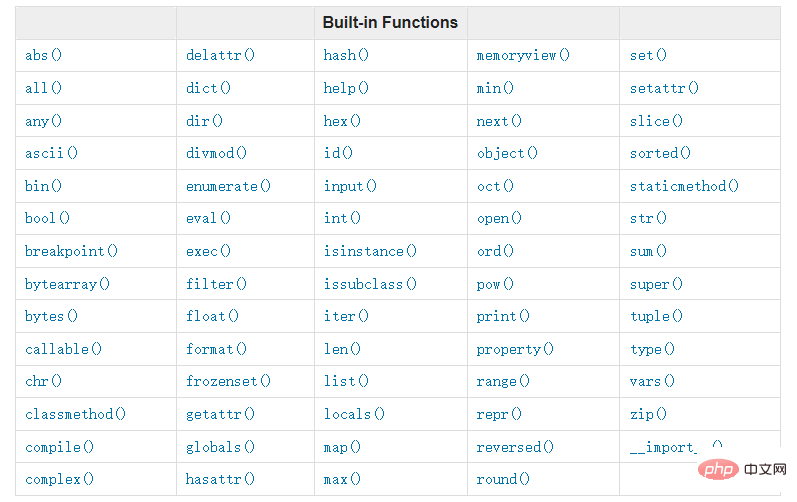Four efficient tips in Python!
Reverse a list
There are usually two ways to reverse a list in Python: slicing orreverse() function call . Both methods can reverse a list, but be aware that the built-in function reverse() changes the original list, while the slicing method creates a new list.
But what about their performance? Which way is more effective? Let’s look at the following example:
Using slices:
$ python -m timeit -n 1000000 -s 'import numpy as np' 'mylist=list(np.arange(0, 200))' 'mylist[::-1]' 1000000 loops, best of 5: 15.6 usec per loop
Using reverse():
$ python -m timeit -n 1000000 -s 'import numpy as np' 'mylist=list(np.arange(0, 200))' 'mylist.reverse()' 1000000 loops, best of 5: 10.7 usec per loop
These two Both methods can reverse a list, but be aware that the built-in function reverse() will change the original list, while the slicing method will create a new list.
Obviously, the built-in function reverse() is faster than the list slicing method!
Swap two values
Swapping two variable values with one line of code is a more Pythonic approach.
Unlike other programming languages, Python does not require the use of temporary variables to exchange two numbers or values. To give a simple example:
variable_1 = 100 variable_2 = 500
To exchange the values of variable_1 and variable_2, only one line of code is needed.
variable_1, variable_2 = variable_2, variable_1
You can also use the same trick with dictionaries:
md[key_2], md[key_1] = md[key_1], md[key_2]
This trick avoids multiple iterations and complex data transformations, thus reducing execution time.
Looping inside a function
We all like to create custom functions to perform our own specific tasks. Then use for to loop through these functions, repeating the task multiple times.
However, using a function inside a for loop requires longer execution time because the function is called on each iteration.
In contrast, if a for loop is implemented inside a function, the function will only be called once.
To explain more clearly, let’s give an example!
First create a simple list of strings:
list_of_strings = ['apple','orange','banana','pineapple','grape']
Create two functions with for loops inside and outside the function, start simple .
def only_function(x):
new_string = x.capitalize()
out_putstring = x + " " + new_string
print(output_string)
And a for function with a loop:
def for_in_function(listofstrings):
for x in list_of_strings:
new_string = x.capitalize()
output_string = x + " " + new_string
print(output_string)
Obviously, the output of these two functions is the same.
Then, let’s compare, which one is faster?


如您所见,在函数内使用 for 循环会稍微快一些。
减少函数调用次数
判断对象的类型时,使用 isinstance() 最好,其次是对象类型标识 id(),对象值 type() 最后。
# Check if num an int type type(num) == type(0) # Three function calls type(num) is type(0) # Two function calls isinstance(num,(int)) # One function call
不要将重复操作的内容作为参数放在循环条件中,避免重复操作。
# Each loop the len(a) will be called
while i < len(a):
statement
# Only execute len(a) once
m = len(a)
while i < m:
statement
要在模块 X 中使用函数或对象 Y,请直接使用 from X import Y 而不是 import X; then X.Y。这减少了使用 Y 时的一次查找(解释器不必先查找 X 模块,然后在 X 模块的字典中查找 Y)。
总而言之,你可以大量使用 Python 的内置函数。提高 Python 程序的速度,同时保持代码简洁易懂。
如果想进一步了解 Python 的内置函数,可以参考下表,或查看以下网站(https://docs.python.org/3/library/functions.html):

The above is the detailed content of Four efficient tips in Python!. For more information, please follow other related articles on the PHP Chinese website!

Hot AI Tools

Undresser.AI Undress
AI-powered app for creating realistic nude photos

AI Clothes Remover
Online AI tool for removing clothes from photos.

Undress AI Tool
Undress images for free

Clothoff.io
AI clothes remover

AI Hentai Generator
Generate AI Hentai for free.

Hot Article

Hot Tools

Notepad++7.3.1
Easy-to-use and free code editor

SublimeText3 Chinese version
Chinese version, very easy to use

Zend Studio 13.0.1
Powerful PHP integrated development environment

Dreamweaver CS6
Visual web development tools

SublimeText3 Mac version
God-level code editing software (SublimeText3)

Hot Topics
 1378
1378
 52
52
 The 2-Hour Python Plan: A Realistic Approach
Apr 11, 2025 am 12:04 AM
The 2-Hour Python Plan: A Realistic Approach
Apr 11, 2025 am 12:04 AM
You can learn basic programming concepts and skills of Python within 2 hours. 1. Learn variables and data types, 2. Master control flow (conditional statements and loops), 3. Understand the definition and use of functions, 4. Quickly get started with Python programming through simple examples and code snippets.
 PHP: Is It Dying or Simply Adapting?
Apr 11, 2025 am 12:13 AM
PHP: Is It Dying or Simply Adapting?
Apr 11, 2025 am 12:13 AM
PHP is not dying, but constantly adapting and evolving. 1) PHP has undergone multiple version iterations since 1994 to adapt to new technology trends. 2) It is currently widely used in e-commerce, content management systems and other fields. 3) PHP8 introduces JIT compiler and other functions to improve performance and modernization. 4) Use OPcache and follow PSR-12 standards to optimize performance and code quality.
 Python: Exploring Its Primary Applications
Apr 10, 2025 am 09:41 AM
Python: Exploring Its Primary Applications
Apr 10, 2025 am 09:41 AM
Python is widely used in the fields of web development, data science, machine learning, automation and scripting. 1) In web development, Django and Flask frameworks simplify the development process. 2) In the fields of data science and machine learning, NumPy, Pandas, Scikit-learn and TensorFlow libraries provide strong support. 3) In terms of automation and scripting, Python is suitable for tasks such as automated testing and system management.
 The Continued Use of C : Reasons for Its Endurance
Apr 11, 2025 am 12:02 AM
The Continued Use of C : Reasons for Its Endurance
Apr 11, 2025 am 12:02 AM
C Reasons for continuous use include its high performance, wide application and evolving characteristics. 1) High-efficiency performance: C performs excellently in system programming and high-performance computing by directly manipulating memory and hardware. 2) Widely used: shine in the fields of game development, embedded systems, etc. 3) Continuous evolution: Since its release in 1983, C has continued to add new features to maintain its competitiveness.
 How to start the server with redis
Apr 10, 2025 pm 08:12 PM
How to start the server with redis
Apr 10, 2025 pm 08:12 PM
The steps to start a Redis server include: Install Redis according to the operating system. Start the Redis service via redis-server (Linux/macOS) or redis-server.exe (Windows). Use the redis-cli ping (Linux/macOS) or redis-cli.exe ping (Windows) command to check the service status. Use a Redis client, such as redis-cli, Python, or Node.js, to access the server.
 How to read redis queue
Apr 10, 2025 pm 10:12 PM
How to read redis queue
Apr 10, 2025 pm 10:12 PM
To read a queue from Redis, you need to get the queue name, read the elements using the LPOP command, and process the empty queue. The specific steps are as follows: Get the queue name: name it with the prefix of "queue:" such as "queue:my-queue". Use the LPOP command: Eject the element from the head of the queue and return its value, such as LPOP queue:my-queue. Processing empty queues: If the queue is empty, LPOP returns nil, and you can check whether the queue exists before reading the element.
 How to view server version of Redis
Apr 10, 2025 pm 01:27 PM
How to view server version of Redis
Apr 10, 2025 pm 01:27 PM
Question: How to view the Redis server version? Use the command line tool redis-cli --version to view the version of the connected server. Use the INFO server command to view the server's internal version and need to parse and return information. In a cluster environment, check the version consistency of each node and can be automatically checked using scripts. Use scripts to automate viewing versions, such as connecting with Python scripts and printing version information.
 Golang: The Go Programming Language Explained
Apr 10, 2025 am 11:18 AM
Golang: The Go Programming Language Explained
Apr 10, 2025 am 11:18 AM
The core features of Go include garbage collection, static linking and concurrency support. 1. The concurrency model of Go language realizes efficient concurrent programming through goroutine and channel. 2. Interfaces and polymorphisms are implemented through interface methods, so that different types can be processed in a unified manner. 3. The basic usage demonstrates the efficiency of function definition and call. 4. In advanced usage, slices provide powerful functions of dynamic resizing. 5. Common errors such as race conditions can be detected and resolved through getest-race. 6. Performance optimization Reuse objects through sync.Pool to reduce garbage collection pressure.





